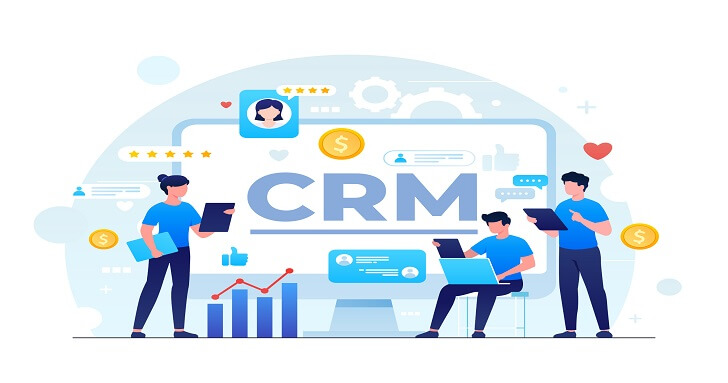The customer relationship management (CRM) revolution is an undeniable force in the sales and marketing landscape of today. Enabled by technology, CRM has become a cornerstone for success when it comes to maximizing customer interactions and gaining valuable insights on how best to engage target markets.
Companies leveraging this technology are driving smarter strategies and enjoying streamlined processes which directly impact bottom-line results. For organizations looking to leverage the true power of CRM, understanding its role within the sales and marketing arena is absolutely essential.
Let’s dive into how embracing this technology can transform your business operations – both now, and in the years to come!
What is CRM and How It can Help to Revolutionize Sales and Marketing
Customer Relationship Management (CRM) is a technology-based approach used to keep track of customer interactions throughout the life cycle, from acquiring new leads to converting and retaining customers. With the invaluable insights that this technology provides, sales and marketing teams can efficiently identify and address areas for improvement within their process.
By generating actionable data on customer behavior, one can develop better targeted campaigns designed to generate higher conversion rates. The enhanced transparency that results from CRM provides an improved understanding of customers’ needs which assists in personalizing experiences as well as delivering high quality service, further helping build strong relationships with customers which translate into increased revenue.
Implementing CRM strategies is an integral step towards revolutionizing sales and marketing and improving overall ops efficiency.
Benefits of Using a CRM System to Build Customer Relationships
Improved Customer Experience:
A CRM system allows you to track and analyze customer interactions, purchase history, preferences, and other data that can help you personalize your communication and provide better customer service.
Increased Efficiency:
A CRM system automates many routine tasks such as data entry, lead management, and follow-ups, freeing up your time to focus on more strategic activities that drive revenue.
Better Collaboration:
A CRM system allows different teams such as sales, marketing, and customer service to access the same data and collaborate effectively across different touchpoints in the customer journey.
Enhanced Sales Performance:
A CRM system provides sales reps with real-time insights into leads and prospects’ behavior, enabling them to tailor their pitch and close deals faster.
Data-Driven Decision Making:
A CRM system provides you with a wealth of data on customers’ behavior, preferences, feedback, and other metrics that can inform your business strategy and help you make informed decisions.
Scalability:
As your business grows, a CRM system can scale with it by providing additional features such as advanced analytics or integrations with other tools.
Overall, using a CRM system is an effective way to build long-lasting customer relationships by providing personalized experiences at scale while streamlining internal processes for greater efficiency and collaboration.
How to Choose the Right CRM Software for Your Business

It can be difficult to select the sales CRM software that best meets your business needs. When choosing the right sales CRM software for your business, it is important to consider factors such as cost, user-friendliness, integrations with other software programs, customer service and more.
Take into account how often sales personnel will need to use the sales CRM, any changes you anticipate making in the near future and whether you would like to buy or subscribe. Quality research and knowledge of your sales process can help you make an informed decision about which sales CRM system best fits your requirements.
Ways to Leverage a CRM System in Order to Optimize Sales and Marketing Efforts
A Customer Relationship Management (CRM) system is a great way to optimize sales and marketing efforts. It enables companies to use automated workflows for sales, marketing, customer service and other processes in order to save time and improve efficiency.
With a CRM system, businesses can easily store contacts, track leads, forecast opportunities and manage campaigns. It also allows them to better engage with customers across different channels by facilitating targeted messaging based on customer data and preferences.
Additionally, a CRM system provides insights into customer behavior which can be used to optimize processes and appropriate strategies. Leveraging the benefits of a CRM system can enhance business performance significantly amid fierce competition in the marketplace.
Best Practices for Implementing and Optimizing a CRM System in Your Business Landscape
Implementing a CRM system can boost the efficiency of your organization by optimizing customer relationship processes. To ensure its smooth implementation, it is essential to use best practices for implementation and optimization. Start with mapping out all internal processes that involve customers and their data. This will provide insights into any possible gaps in the existing processes.
Furthermore, you should think about adding automation tools wherever feasible to free up manual labor and improve productivity. Additionally, consider leveraging customer segmentation strategies to serve targeted content or offers based on customer interest or behavior.
Finally, make sure to evaluate user feedback often to ascertain which of the implemented methodologies have been successful and what areas still needs improvement for further optimization of the CRM system.
Conclusion
CRM is an incredibly powerful tool for businesses of all sizes, and when used correctly, it can revolutionize sales and marketing processes. The ability to leverage insights obtained through customer interaction data coupled with personalized communication strategies can help to drive better results, as well as build loyalty and engagement with customers.
By implementing best practices for building relationships through dynamic customer service, companies can create unique customer experiences that foster long-lasting relationships with customers. As technology continues to progress at a rapid pace, organizations should make sure to keep up with the industry’s latest innovations in order to maximize their CRM effectiveness and ensure a competitive advantage.
Ultimately, paired with hard work and dedication from a company’s marketing team, investing in the right CRM technology can help launch any business into success.

